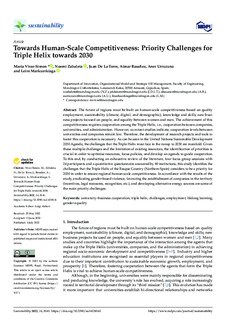| dc.rights.license | Attribution 4.0 International | * |
| dc.contributor.author | Vivar-Simon, Maria | |
| dc.contributor.author | Zabaleta, Noemí | |
| dc.contributor.author | De la Torre , Juan | |
| dc.contributor.author | Basañez-Zulueta, Aimar | |
| dc.contributor.author | Urruzuno Pagoaga, Aner | |
| dc.contributor.author | Markuerkiaga, Leire | |
| dc.date.accessioned | 2022-10-17T14:40:14Z | |
| dc.date.available | 2022-10-17T14:40:14Z | |
| dc.date.issued | 2022 | |
| dc.identifier.issn | 2071-1050 | en |
| dc.identifier.other | https://katalogoa.mondragon.edu/janium-bin/janium_login_opac.pl?find&ficha_no=168144 | en |
| dc.identifier.uri | https://hdl.handle.net/20.500.11984/5748 | |
| dc.description.abstract | The future of regions must be built on human-scale competitiveness based on quality employment, sustainability (climate, digital, and demographic), knowledge and skills, new business projects focused on people, and equality between women and men. The achievement of this competitiveness requires cooperation among the Triple Helix, i.e., cooperation between companies, universities, and administration. However, as extant studies indicate, cooperation levels between universities and companies remain low. Therefore, the development of research projects and tools to foster this cooperation is necessary. As can be seen in the United Nations Sustainable Development 2030 Agenda, the challenges that the Triple Helix must face in the runup to 2030 are manifold. Given these multiple challenges and the limitation of existing resources, the identification of priorities is crucial in order to optimise resources, focus policies, and develop an agenda to guide cooperation. To this end, by conducting an exhaustive review of the literature, four focus group sessions with 24 participants and a quantitative questionnaire answered by 90 institutions, this study identifies the challenges that the Triple Helix of the Basque Country (Northern Spain) considers to be a priority for 2030 in order to ensure regional human-scale competitiveness. In accordance with the results of the study, eradicating gender-based violence, favouring the establishment of companies in the territory (incentives, legal measures, recognition, etc.), and developing alternative energy sources are some of the main priority challenges. | es |
| dc.description.sponsorship | Diputación Foral de Gipuzkoa | es |
| dc.language.iso | eng | en |
| dc.publisher | MDPI | en |
| dc.rights | © 2022 by the authors. Licensee MDPI | en |
| dc.rights.uri | http://creativecommons.org/licenses/by/4.0/ | * |
| dc.subject | University Business Cooperation | en |
| dc.subject | triple helix | en |
| dc.subject | challenges | en |
| dc.subject | employment | en |
| dc.subject | lifelong learning | en |
| dc.subject | gender equality | en |
| dc.title | Towards Human-Scale Competitiveness: Priority Challenges for Triple Helix towards 2030 | en |
| dcterms.accessRights | http://purl.org/coar/access_right/c_abf2 | en |
| dcterms.source | Sustainability | en |
| local.contributor.group | Innovación, gestión, organización | es |
| local.description.peerreviewed | true | en |
| local.identifier.doi | https://doi.org/10.3390/su14138141 | en |
| local.rights.publicationfee | APC | en |
| local.source.details | Vol. 14. Nº. 13. N. artículo 8141. July, 2022 | en |
| oaire.format.mimetype | application/pdf | |
| oaire.file | $DSPACE\assetstore | |
| oaire.resourceType | http://purl.org/coar/resource_type/c_6501 | en |
| oaire.version | http://purl.org/coar/version/c_970fb48d4fbd8a85 | en |








